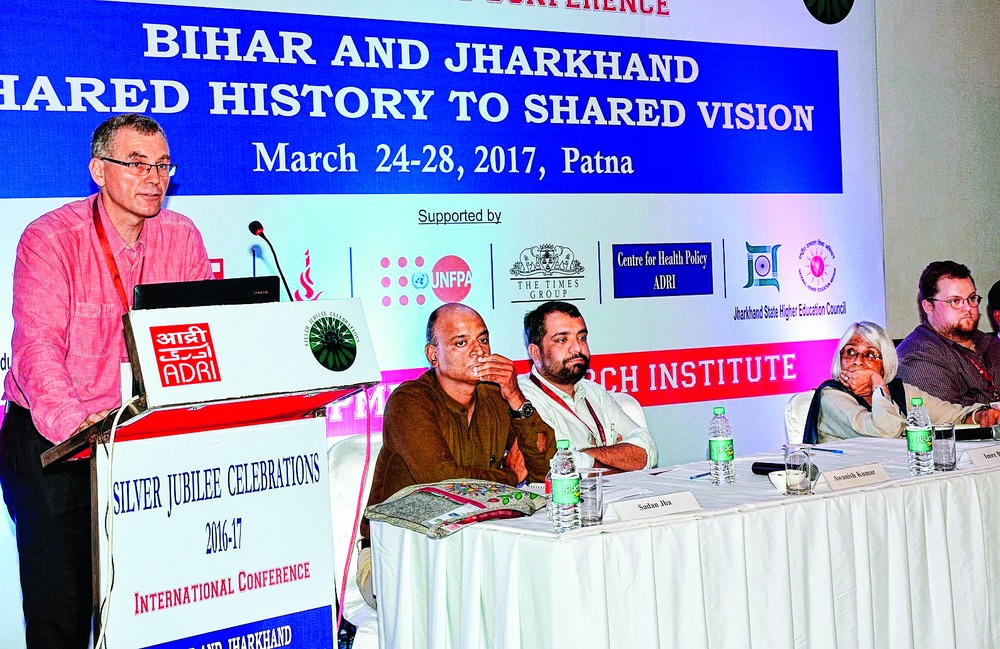
The demonetisation decision of Prime Minister Narendra Modi was a violation of people's liberal freedom, a participant at the Asian Development Research Institute's international conference said on Sunday.
Ashutosh Varshney, professor of political science, international and public affairs at Brown University, Rhode Island, US, said it was violation because someone cannot just withdraw currency from circulation like it was done post the Prime Minister's announcement on November 8 last year. He said democracy was all about ensuring freedom of expression, religious practice and association.
"India has witnessed 16 national elections and 362 state elections since 1952 and power has changed hands eight times in Delhi and tens of times at the state level," Varshney said on the third day of the international conference on "Bihar and Jharkhand: Shared History to Shared Vision" ADRI has organised to mark the conclusion of its year-long silver jubilee celebrations. "The country's electoral record is vibrant but its record on liberal freedoms continues to be shaky."
The Brown professor also analysed how the BJP, by garnering around 40 per cent votes spread over diverse caste groups, including backward and scheduled castes categories, won the Uttar Pradesh Assembly polls. He added that the party would rule the state for the next 10 to 20 years if it maintained around 40 per cent votes. Harry Blair, senior research scholar at Yale University, chaired Varshney's session.
Six lectures and as many technical sessions were held during on Sunday, attracting delegates and select audience from different countries.
Another lecture of the day was chaired by economist Lord Meghnad Desai and delivered by Rathin Roy, director of National Institute of Public Finance and Policy, New Delhi. Roy spoke on "Some reflections on inclusive growth and fiscal policy in contemporary India" and argued that the role of fiscal policy could be seen in two ways - an instrument to promote productive inclusion, and to intervene in the income distribution by executing the second theorem of welfare economics: any efficient allocation can be sustainable by a competitive equilibrium.
Vasudha Dalmia, professor emerita, University of California, delivered a lecture on "The novel and the city: modernity and modernism in the Hindi world". Nitin Sinha, senior fellow at the Centre of Modern Oriental Studies, Berlin, presented his research paper on "The home and the hearth in the age of steam: poetic imagination and Bhojpuriya women". Nitin Verma, researcher at Humboldt University, Berlin, presented his research paper on "Divorce trials and domestic servants in early colonial India: the case from Ramonee from Patna".
Ramonee was a domestic maid from Patna who worked in European households in northern and eastern India. Her biography has been constituted on the basis of court testimonies and contextual evidences.
At one technical session on "Governance challenges: growth and development", Areendam Chanda, a professor of economics at the Louisiana State University, used data culled from the US government's Defence Meteorological Satellite Programme on use of night lights between 8.30pm and 10pm across India to analyse economic development.
He said the state's policies were very important for the growth of districts and said that Bihar and Jharkhand were not particularly different from each other in various aspects of growth.
Chirashree Das Gupta, associate professor of law and governance gave a presentation on "Challenge of governance: growth, development and social justice" in the context of Bihar and Sisir Debnath, assistant professor of economics and public policy at Indian School of Business (ISB), Hyderabad, analysed the mid-day meal scheme in Bihar government schools and highlighted how it was not monitored well.











